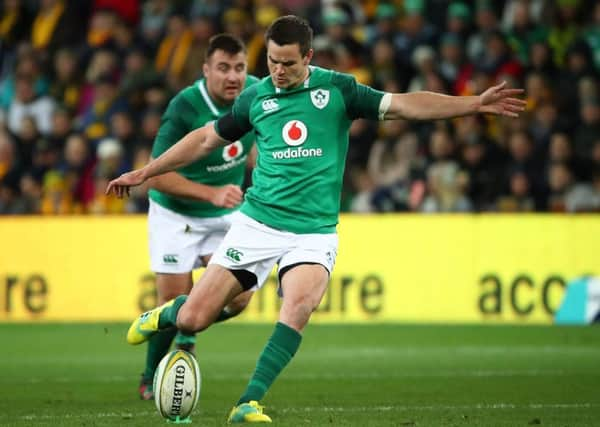Allan Massie: Captain's influence is no longer a major factor


Yet it would be surprising if Leinster’s coaches, Leo Cullen and Stuart Lancaster, hadn’t had their doubts and reservations concerning the appointment. These would of course have had nothing to do with Sexton’s ability or character, but simply about the circumstances, the chief question being “how often will he be available for Leinster?”
Joe Schmidt and his employers at the IRFU are pretty good at managing the workload of Ireland’s stars, among whom none shines brighter than Sexton. Given that this season will be followed, after only a short break, by international matches a year from now in preparation for the World Cup in Japan, I would reckon that Sexton, now in his early 30s, will be made unavailable for most of Leinster’s Guinness Pro14 matches. After all, in addition to Ireland’s international programme, Leinster will expect to play at least seven Champions Cup games, and will surely require Sexton for most of these. In contrast, Nacewa had of course no Test rugby commitments. His focus was entirely on Leinster, as Sexton’s can’t be. When Cullen himself was a very successful Leinster captain he was mostly only on the fringe of the Ireland team, Paul O’Connell and Donncha O’Callaghan being the locks in residence.
Advertisement
Hide AdAdvertisement
Hide AdSome think captains less important these days, certainly less important than the coaches. It’s also true that there is often little identifiable that a captain may have done to influence the course of a match, likewise little that he could have done. This may be said of coaches too, whose influence is often restricted to deciding when to bring on replacements. Indeed the frequency with which captains of international teams find themselves replaced indicates that many coaches don’t think having the appointed captain there for the full 80 minutes is of any importance. I doubt if Dylan Hartley has played beyond the hour mark since Eddie Jones made him the England captain. That’s to say, he has been off the field in the last quarter when so many matches are won or lost. His influence in the dressing room and in training sessions is, one supposes, more highly valued.
It has become quite usual for club coaches to give the captaincy to an overseas player who will not be distracted by international ambitions or summonses to national squad training and, of course, international matches too. So, last season, Dave Rennie handed the Glasgow captaincy to his fellow New Zealander, Callum Gibbins. This seemed to be working well, until Gibbins was injured, missed the middle months of the season, and failed to recapture his earlier outstanding form when he returned. One had the impression that Glasgow’s decline in the spring owed quite a lot to a failure of leadership, both on and off the field. It was different in Edinburgh, quite a reversal of things in a short time.
One of the more remarkable statistics is that, since taking over as Scotland coach for the summer tour of 2017, Gregor Townsend has capped 16 players, more than a full starting team indeed, for the first time.
Admittedly the proliferation of international matches and the inescapable, if to many of us regrettable, fact that a rugby team now effectively consists of 23 players, not 15, means that international caps are dished out if not quite as freely as confetti at a wedding, yet far freely than used to be the case. Townsend’s Scotland have played 14 Tests . To put things in perspective I might remark that Hugh McLeod, great prop for Hawick, The South, Scotland and the Lions, took from 1954 to 1962 to surpass John M Bannerman’s record of 37 Scotland caps – a record that had stood since the early 1930s.
McLeod, one might add, was never dropped – which, given the vagaries of Scottish selectors is itself remarkable – and of course played the full 80 minutes in each of his 40 Scottish international appearances.
As it is, I think you would have to have your wits about you, and your memory functioning well, to name these 16 players first capped since the early summer of last year – and to do so in, say, 16 minutes.
A second and perhaps more daunting challenge would be to list all the currently active players who have represented Scotland. I can only guess how many there are, but I would wager you can get more than four or five full 15s, even if not every position might be filled in the fourth or fifth teams.